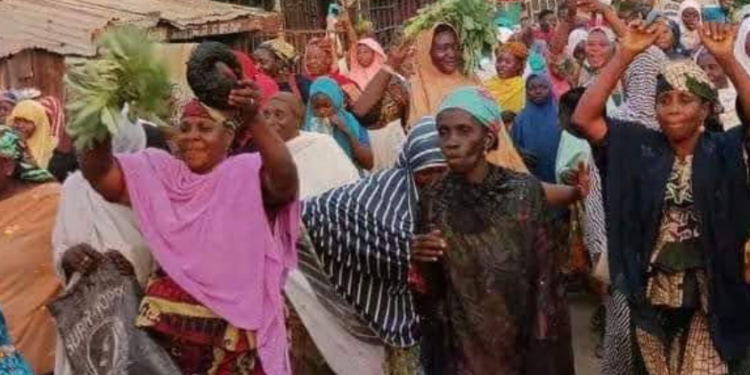Following the current economic hardship in the country, hundreds of traders in Lokoja, the Kogi State capital, trooped out on Wednesday to protest over high cost of essential commodities across the state.
The traders mainly market women and men lamented the soaring prices of food items which had affected patronage.
Mrs Ladi, a trader who deals in rice and beans, said the sharp increase in the cost of the commodities had affected her business capital as sales were low.
She stated that she could hardly make profit after trading.
“Mudu of rice which was selling for N800 now costs N1,700. This is because a bag of rice which cost N35,000 has now increased to N65,000. With this, we cannot make our own profit.
“This is the reason we are calling on the government to come to our aid by subsidising commodities grown in Nigeria. We are tired of low sales,” she said.
Another trader lamented that despite efforts by traders to part with some profits on goods, poor patronage had become discouraging.
“There is nothing to show for our efforts in terms of expected gains or profit. We are only praying that our labour should not be in vain at the close of trading activities,” she said.
Mrs Laruba, who sells palm oil, lamented that she usually travelled to Kogi East to purchase the commodity.
However, she expressed regrets that the business was no longer profitable.
She added that by the time she calculated her expenses and subtracted the same from the cost of the items, buyers often felt cheated.
Mrs Adah, a vegetable trader, urged the Federal Government to address the astronomical increase in the cost of food items.
She said, ”Prices of pepper, rice, beans among others have all gone up and the hike in price cut across every item. To worsen the situation, the government is not helping matters.
“We are pleading with the government to assist us with a view to ensuring the reduction in the price of food items. We are only managing to eat. The hike in price of commodities has almost eroded our profit.”
Our correspondent who visited some markets in Lokoja discovered that most traders had closed shop as buyers no longer patronised them, due to exorbitant cost of commodities.
